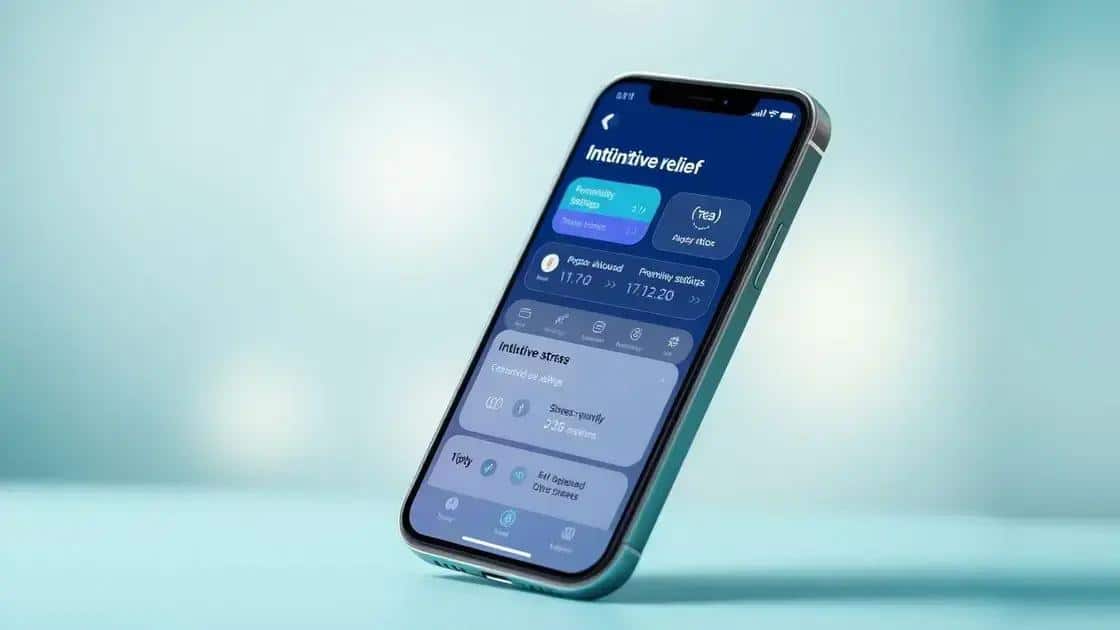Insights on stress management apps that really help

Stress management apps help individuals cope with anxiety and improve mental health through features like guided meditations, mood tracking, and community support, making it essential to choose the right app based on personal needs and goals.
Insights on stress management apps can open up new ways for you to cope with daily pressures. Have you ever wondered which app would best support your journey toward a calmer mind? Let’s dive in!
Understanding stress management apps
Understanding stress management apps can be a pivotal step in taking charge of your mental health. In a world full of distractions, these apps are designed to help you navigate through stress and anxiety effectively.
What Makes a Good Stress Management App?
Not all stress management apps are created equal. A quality app should have several key features that make it useful for users. Look for:
- User-friendly interface
- Personalized programs based on your needs
- Tracking tools to monitor your progress
- Engaging content such as articles, videos, and exercises
These features enhance the user experience and can lead to better outcomes in managing stress.
Why Do People Use Stress Management Apps?
Many individuals turn to stress management apps for a variety of reasons. Some enjoy the convenience of accessing techniques and resources from their phones. Others value the privacy these apps offer, allowing them to explore their mental well-being without fear of judgment. Additionally, the ability to tailor your experience based on your unique stressors can make these apps particularly appealing.
With regular use, these apps can promote mindfulness and help you develop coping strategies. Users often find that engaging with guided meditations or relaxation exercises not only reduces anxiety but also encourages a more balanced lifestyle. Integrating these tools into your daily routine may lead to significant improvements in your overall mood and productivity.
Considerations When Choosing an App
Before downloading an app, think about what you want to achieve. Create a list of your stress triggers and how you hope an app can assist you. Remember that the best app for someone else might not be the right fit for you. Here are important considerations:
- Cost: Are you looking for free options or willing to pay for premium features?
- Compatibility: Does it work on your device?
- Reviews: What do other users say about its effectiveness?
- Privacy policies: Make sure your data is safe and secure.
By focusing on these aspects, you can find an app that truly resonates with your needs and enhances your stress management journey.
Key features to look for in apps

When choosing a stress management app, it’s crucial to know which features can really make a difference. Different apps offer various functionalities that cater to individual needs. Understanding these can help you maximize their benefits.
User-friendly Interface
A simple and intuitive design is essential. You want an app that is easy to navigate. If you find it complicated to use, you are less likely to stick with it. Look for apps where the layout is clear, and the functions are easily accessible.
Personalization
Apps that allow you to personalize your experience can be more effective. For instance, they might ask about your stress levels and specific triggers. Based on your input, they should offer tailored recommendations and techniques.
- Guided meditations that suit your time constraints
- Customized relaxation exercises
- Goal settings based on your specific stressors
This level of personalization ensures you find exactly what works for you.
Progress Tracking
Being able to track your progress is a motivating factor. Look for apps that provide insights into your journey. They should track improvements in mood, stress levels, or even meditation durations over time. Seeing progress can encourage you to keep using the app.
Quality Content
The material provided in the app is vital. High-quality resources, such as articles, videos, and audio clips, can enhance your learning and engagement. Make sure the app offers reliable information from experts in mental health.
With an engaging content library, you will want to explore more and incorporate various techniques into your routine.
Community Features
Some apps offer community support where users can connect and share experiences. This can be an added benefit, fostering a sense of belonging and encouragement. Participating in forums or group sessions within the app can provide invaluable peer support.
Real user experiences with stress management apps
Real user experiences with stress management apps can provide valuable insights into how these tools impact daily life. Many individuals share stories about their journey with these apps, highlighting both challenges and successes in managing their stress.
Positive Outcomes
Users often report significant improvements in their mental well-being. For instance, people have found that incorporating guided meditations has helped them to reduce anxiety and enhance focus. Some even describe a newfound sense of calmness that they can carry throughout their day.
Community Support
Many users appreciate the community features in stress management apps. They find comfort in connecting with others who share similar experiences. Engaging in group forums and discussions can provide encouragement and tips for overcoming obstacles. This sense of belonging can be empowering, helping users remain committed to their mental health journey.
- Sharing stories allows users to learn from one another
- Support groups can provide motivation
- Real-time feedback helps users feel connected
As these users support each other, they also build lasting friendships that extend beyond the app.
Challenges Faced
While there are many success stories, some users encounter challenges. For example, certain individuals may struggle with app engagement due to lack of time or motivation. It can also be frustrating when the app does not seem to meet their specific needs. However, many find that sticking with it and customizing their approach can lead to long-term benefits.
Understanding that not every app works for everyone is essential. Some users might try multiple apps before finding one that resonates. By sharing their experiences, they can help others navigate their choices.
Overall Satisfaction
Despite the challenges, many users feel overall satisfaction with their stress management apps. Regular use has led to improved coping strategies and better management of day-to-day stressors. Users express appreciation for the resources available within the apps, making them feel more empowered in their mental health journey.
How to choose the right app for your needs

Choosing the right app for your needs is crucial when it comes to managing stress effectively. With so many options available, it can feel overwhelming. However, there are key factors to consider that can simplify this decision-making process.
Identify Your Goals
The first step in choosing an app is to identify your goals. Are you looking to reduce anxiety, improve mindfulness, or simply track your mood? Recognizing what you want to achieve helps narrow down your options. Each app has different strengths, so align your goals with their features.
Evaluate Features
Next, evaluate the features of each app. Some important features to look for include:
- Guided meditations to help you relax
- Progress tracking to monitor your improvement
- Customization options based on your personal stressors
- Community support for shared experiences
Having the right features can make your experience more effective and enjoyable.
Check User Reviews
Before making a decision, read user reviews and ratings. Real experiences from other users can provide insight into what to expect. Look for comments about how well the app helped users manage their stress and any potential downsides. This can help you make a more informed choice.
Consider Your Budget
Another factor is your budget. Many stress management apps offer free versions, while others may require a subscription. Determine what you are willing to invest in your mental health. If going for a paid app, check if it provides a free trial to test its effectiveness before committing.
Ultimately, finding the right app involves balancing your goals, features, user feedback, and budget. By taking the time to evaluate these aspects, you can select an app that aligns with your needs and supports your journey toward managing stress.
FAQ – Frequently Asked Questions about Stress Management Apps
What are stress management apps used for?
Stress management apps are designed to help users cope with stress, anxiety, and improve overall mental health through techniques like meditation, mood tracking, and relaxation exercises.
How do I choose the best stress management app for me?
To choose the best app, identify your goals, evaluate features, check user reviews, and consider your budget. This will help you find an app that fits your individual needs.
Are stress management apps effective?
Yes, many users report improvements in their mental well-being when using stress management apps. Consistent use can lead to better coping strategies and reduced anxiety.
Can I use stress management apps for free?
Many stress management apps offer free versions or trials, allowing you to experiment with the features before deciding whether to pay for premium options.





